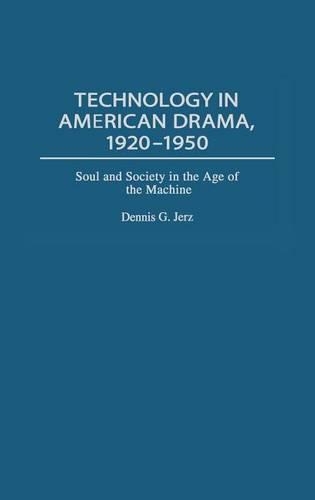
Technology in American Drama, 1920-1950: Soul and Society in the Age of the Machine
(Hardback)
Publishing Details
Technology in American Drama, 1920-1950: Soul and Society in the Age of the Machine
By (Author) Dennis G. Jerz
Bloomsbury Publishing PLC
Praeger Publishers Inc
30th March 2003
United States
Classifications
Tertiary Education
Non Fiction
Literary studies: c 1900 to c 2000
Technology: general issues
812.5209356
Physical Properties
Hardback
184
Description
Explores dramatic representations of the relationship between humans and machines during an age when technology became increasingly domesticated and accepted as an index to the American dream. American drama between 1920 and 1950 explores the relationship between humans and machines during an age when technology became increasingly domesticated and accepted as an index to the American dream. The Marriage between dramatic art and dramatic technology stems from both the physical realities of staging and the intimate connection of technology with human labor inside and outside the household. Technology shapes and defines the values of the soul, individually and collectively, in addition to producing the external environment in which people live. This book studies how playwrights of the era reflected the changing role of technology in American society. Drawing on the experiments of European Expressionism, American dramatists of the 1920s found new techniques for developing character and theme, along with innovative staging devices, such as the threatening machines in Elmer Rice's The Adding Machine, Sophie Treadwell's Machinal, and Eugene O'Neill's Dynamo. By the time Thornton Wilder, Tennessee Williams, and Arthur Miller established the canon of American drama, technology was no longer an impersonal force to be resisted, but a conventional and integral component of domestic life. In examining these dramatists and their works, this book provides an insightful analysis of a largely neglected topic.
Reviews
Filling a glaring gap in the study of the development of American expressionism and subsequent trends in playwriting, this volume stands alone in making a serious effort to examine the technological issues America was facing after WW I and the few playwrights (working within expressionistic drama) who were writing about these issues....Directors contemplating presenting one of these plays and teachers of dramatic literature will find the book most helpful. Terrific bibliography. Greenwood Press deserves a great deal of praise for its commitment to this series, and this volume is a worthy addition. Essential. All academic and public libraries with extensive theater collections.-Choice
"Filling a glaring gap in the study of the development of American expressionism and subsequent trends in playwriting, this volume stands alone in making a serious effort to examine the technological issues America was facing after WW I and the few playwrights (working within expressionistic drama) who were writing about these issues....Directors contemplating presenting one of these plays and teachers of dramatic literature will find the book most helpful. Terrific bibliography. Greenwood Press deserves a great deal of praise for its commitment to this series, and this volume is a worthy addition. Essential. All academic and public libraries with extensive theater collections."-Choice
Author Bio
DENNIS G. JERZ is Assistant Professor of English at University of Wisconsin, Eau Claire, where he studies literary representations of interactions between humans and machines. He has published a computer simulation of the motion of pageant wagons in the medieval York Corpus Christi pageant, articles about teaching English via the Web, and an annotated bibliography of scholarship on text-based computer games.
